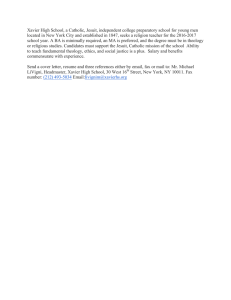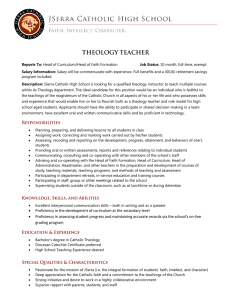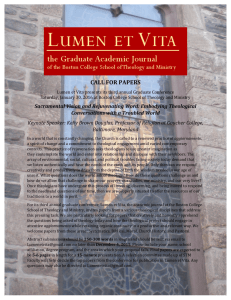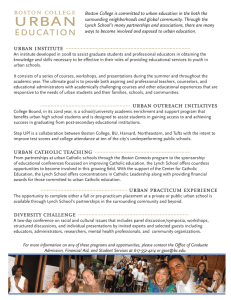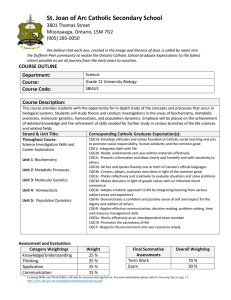“The Making of a Post-Vatican II Theologian: Reflections
advertisement
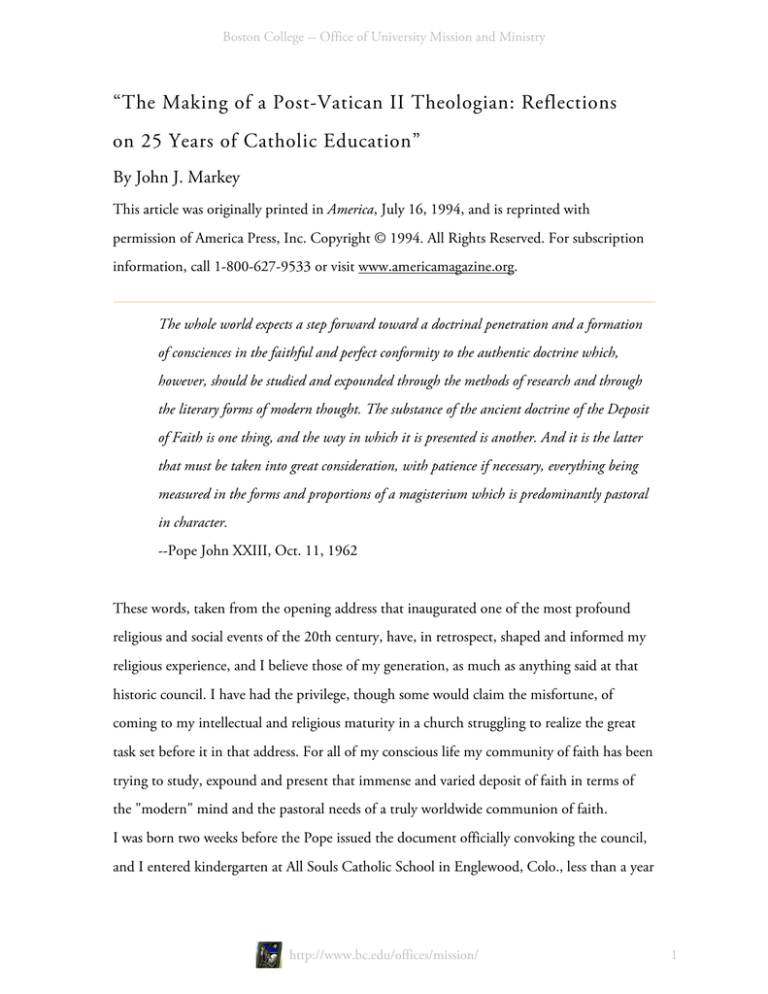
Boston College -- Office of University Mission and Ministry “The Making of a Post-Vatican II Theologian: Reflections on 25 Years of Catholic Education” By John J. Markey This article was originally printed in America, July 16, 1994, and is reprinted with permission of America Press, Inc. Copyright © 1994. All Rights Reserved. For subscription information, call 1-800-627-9533 or visit www.americamagazine.org. The whole world expects a step forward toward a doctrinal penetration and a formation of consciences in the faithful and perfect conformity to the authentic doctrine which, however, should be studied and expounded through the methods of research and through the literary forms of modern thought. The substance of the ancient doctrine of the Deposit of Faith is one thing, and the way in which it is presented is another. And it is the latter that must be taken into great consideration, with patience if necessary, everything being measured in the forms and proportions of a magisterium which is predominantly pastoral in character. --Pope John XXIII, Oct. 11, 1962 These words, taken from the opening address that inaugurated one of the most profound religious and social events of the 20th century, have, in retrospect, shaped and informed my religious experience, and I believe those of my generation, as much as anything said at that historic council. I have had the privilege, though some would claim the misfortune, of coming to my intellectual and religious maturity in a church struggling to realize the great task set before it in that address. For all of my conscious life my community of faith has been trying to study, expound and present that immense and varied deposit of faith in terms of the "modern" mind and the pastoral needs of a truly worldwide communion of faith. I was born two weeks before the Pope issued the document officially convoking the council, and I entered kindergarten at All Souls Catholic School in Englewood, Colo., less than a year http://www.bc.edu/offices/mission/ 1 Boston College -- Office of University Mission and Ministry after the council officially ended. I would go on to attend Catholic primary and secondary school, a Catholic college, to teach in a Catholic high school and parish, join a religious order and be ordained to the priesthood and am currently writing a dissertation on Catholic ecclesiology for my doctorate in systematic theology. This educational odyssey has taken me from Colorado to San Antonio, Tex., South Bend, Ind., Columbia, S.C., and Berkeley, Calif. The résumé not only suggests that I should finally leave school and get a real job (as both my father and my provincial believe), but that I have been as thoroughly enmeshed in the post-Vatican II Catholic milieu as is either possible or tolerable. I have never attended a Latin Mass, was never taught the Baltimore Catechism, was not imbued from an early age with "Catholic guilt." I have never gone to confession in the "box" and have no memory of "meatless Fridays," except occasionally during Lent. Although I have been taught by many religious sisters and brothers (none of whom wore a full habit other than an occasional veil), very few of them were mean, angry, or abusive. On the contrary, I have always found them to be among the most interesting, compassionate and entertaining mentors and am sure that it was the combination of dedication, camaraderie and joy I witnessed in my early and secondary education that led me, eventually, to my present state in life. It has occurred to me recently that I am among the first of a generation raised and educated entirely in a post-Vatican II context, which differed profoundly from the era that immediately preceded it. What follows offers a personal account of what I have learned. I do not claim that my experience is definitive or representative of an entire generation. Rather, I attempt to offer some tentative characterizations of the shift in emphasis that has shaped Catholic religious education, and hence the disposition and outlook of many Catholics in the years following the council. I will present six generalizations of the issues, themes and methods that have consistently characterized my religious education from primary school through my doctoral program. I will also offer a personal comment upon the state of the church as I see it in the light of my generational and individual experience. http://www.bc.edu/offices/mission/ 2 Boston College -- Office of University Mission and Ministry GENERAL CHARACTERISTICS OF POST-VATICAN II EDUCATION I. The Centrality of Scripture. The Bible has been the basis of my entire religious education. My first grade religion class consisted mostly of Mrs. Wassinger, a particularly gifted storyteller, telling us countless Bible stories, and us asking her to repeat one or another of them, as we had the Dr. Seuss books we had been weaned on. Actually, throughout grade school, except when the demands of sacramental preparation intervened, "religion class" almost exclusively meant studying the Bible in some way; the Bible had become our catechism. Though we studied other aspects of the Catholic faith and were thoroughly instructed in morality (especially sexual morality), the basis for these discussions was not "the catechism" per se, but textbooks based upon Scripture and largely the Bible itself. During high school this trend continued: The first two full years of religious education consisted of studying first the Hebrew and then the Christian Scriptures. In college also, everyone was required to take at least one introductory level course on Scripture; and about a third of the courses required for a major in theology were devoted to scriptural study. This pattern was true of both my master's level and seminary education as well. It was an assumption of my theological education that any serious theology had at least to refer to, and generally be grounded in, a credible scriptural exegesis or an insight derived from a new interpretation of an important text. Furthermore, it is noteworthy that most of the major trends and controversies in Roman Catholic theology since the council, especially feminism, various liberation theologies and moral theology, have in some significant sense been grounded in a new method of interpretation of scriptural texts. 2. The Recognition of Diversity To grow up in America in the 1970's and 80's was to grow up profoundly conscious of the basic diversity of every aspect of life: religious, cultural, ideological, physical and class diversity. And from our earliest days we were taught not only that we had to respect http://www.bc.edu/offices/mission/ 3 Boston College -- Office of University Mission and Ministry diversity. but that it was a fundamental good of our society. While a previous generation of Catholics may have eschewed theological diversity or at least viewed it with suspicion. we embraced it in a way that made it central to any discussion of religion. Coming to terms with pluralism has been a hallmark of my entire religious education. In grade school and high school, the study of other Christian denominations and other religions was a standard part of the curriculum. While it was still implicitly presumed that our particular type of Christianity was superior, we generally refrained from focusing on the obvious. Instead we were taught to appreciate the connections we shared with other Christians and with non-Christian religions and to value and respect the genuine differences that made each unique. By the time I reached college, the study of theology necessarily implied the systematic study of diversity (i.e., the plurality of perspectives through which one could view any aspect of theology). In retrospect, I see now that one of the primary effects of Vatican II was to challenge the Roman Catholic Church to become a truly worldwide and ecumenical church. This implied that it had to take seriously the radical cultural, social, political and ideological diversity of the world, and try to incarnate its traditions, institutions and theology within each context. Obviously, for some people this process has been a nightmare, and maybe even a mistake. But for better or worse, the task that has become known as "inculturation" has shaped the content of most post-Vatican II theology. In practical terms, it has fragmented the theological process, as each culture and subculture must first identify itself and then attempt to appropriate the long and varied Christian tradition in terms of its own thought-forms, customs and language. Added to this has been the growing recognition that each culture not only has traditions that need to be valued and appropriated by the church, but also that each culture has structures of sin and oppression that need to be challenged and liberated by the Gospel. THE CONSTANT RECOGNITION of the complexity and extent of diversity has often left me searching for the source of unity and continuity within the one community, the one church. Scholars of a previous generation had to deal with the problem of continuity over http://www.bc.edu/offices/mission/ 4 Boston College -- Office of University Mission and Ministry time in what became known as the controversy of the "development of dogma." Central to this debate was the question of how the church could claim that many of its central statements were true, given the fact that they had changed, grown and developed over time. In a similar way, during my lifetime the church is struggling to come to terms with unity and continuity over space: How can we understand our unity of faith when it is articulated differently and in different contexts at the same time? Whereas previous theology had to deal with diversity in successive cultural contexts, now we are challenged to accept cultural and contextual diversity simultaneously. This issue of unity and plurality lies at the heart, I believe, of many of the most important theological controversies of our day. While I have no ready formula for understanding how a unity of faith is possible between communities living in such radically diverse contexts, I suspect that our answer to the problem will be similar to that of our predecessors: It will be found in a renewed pneumatology that clearly articulates the essential role that the Holy Spirit plays in the life of the church and all of the various communities which are part of it. 3. The Question of Authority. I do not have any specific memories of the thunderclap of Humanae Vitae (1968), but I do know that this document has profoundly shaped my subsequent religious experience. I remember, however, sitting at the dinner table one night with a large number of our extended family and my parents' friends (all undoubtedly Catholic), listening to an emotional discussion about what I later realized must have been the papal document. After much debate and intense distress on the part of some of those present, I clearly recall my uncle asking loudly: "Who gave them the right to tell me and my wife how we should make the most important and personal decision of our married life?" I remember this clearly because it totally stopped the conversation--the table remained silent and no reply was given. In talking to my parents now, I understand that the silence did not indicate either agreement or disagreement, but the shocked realization that such a question could even be raised. http://www.bc.edu/offices/mission/ 5 Boston College -- Office of University Mission and Ministry My generation assumes that such a question can and must be raised. We also have come to realize that this question can be answered in a variety of ways. The hierarchy and its advocates quickly respond that God, through Christ, has given them not only the right but the obligation to determine such things. Other voices claim that the primacy of the baptismal vocation and the priesthood of all believers insisted upon by Vatican II widened the responsibilities for decision-making and moral judgments to include all the baptized. I have always sensed that most subsequent debates within the church, especially those involving sex, are primarily about authority rather than the topic at hand. Who has authority? Where does authority come from? To what extent can and should those with authority exercise it? What about those people who do not agree with the people who claim to have authority? Who actually has the power that underlies authority and makes it efficacious? These are the questions that have recurred throughout my theological training and, in fact, underlie most of the other issues at hand. I believe that how one answers these questions depends on two things: I) one's view of the working of grace and revelation; 2) how one understands the possibility of any truth claims being made at all. In regard to the first issue, the two main theologies of grace and revelation proposed during my education could be rather crudely described as "trickle-down" or "equal-access" theories of grace. "Trickle-down" people believe that, fundamentally, grace, revelation, spiritual power, etc., were given by Jesus to the apostles, who in turn passed these on to their successors: first the pope, then bishops, and then through their agents (priests, deacons and religious) to all the baptized. "Equal-access" people believe that the fullness of Christian vocation, and hence grace and revelation, are given to each person through initiation into the community of faith. Vocation to orders (episcopate, presbyterate and diaconate), like the vocation to marriage, simply specifies the baptismal call and, therefore, whatever power or authority holy orders confer is in some way shared by all the faithful through the power of the Spirit equally accessible to all believers. http://www.bc.edu/offices/mission/ 6 Boston College -- Office of University Mission and Ministry IN REGARD TO the second issue, as to whether morally binding truth claims can be made at all, I discern three main (again rather crude) categories. First of all, there are those who in fact hold an implicit relativism. They believe that no one can know the full, complete and "objective" truth--at least that we can all agree upon--and so individuals must remain free to determine for themselves what is best, based on their own conscience and whatever other resources they can muster. These people should not be judged negatively if their intentions are fundamentally good. Second, there are those who advocate an implicit (or explicit) fundamentalism. Relativism is psychologically and intellectually unbearable and so there must be "objective" sources of truth readily available to all who sincerely seek the truth. These objective sources (e.g., the Bible, the pope, Thomas Aquinas, apparitions of Mary, direct revelation by the Holy Spirit to some person) are true and therefore are morally and intellectually binding on all. These sources must be obeyed unquestioningly by all members of the community if they want to remain participants. Third, there seems to be a large group of people who stand somewhere in the middle. Many believers reject total relativism, but also cannot stomach fundamentalism nor those who advocate it. In the theological field there are many who likewise take a middle position, believing that truth can be known but that it is complex and can only be fully known and appropriated through a continuing and faithful dialogue. The average person in the third position, although often unfairly caricatured as a "cafeteria Catholic," tries to negotiate among all the competing truth claims and may actually more truly occupy the Catholic tradition than those proposing either of the other two positions. 4. The Presence and Treatment of Women in the Church and Tradition. At this point I must emphasize that I am not really a "baby boomer." I am a member of that nameless "generation X" that followed them and who were largely the beneficiaries of the struggle for equal rights that they and their parents fought. By the time I was in school we (the boys) readily presumed that the "girls" had equal rights and were more than ready to http://www.bc.edu/offices/mission/ 7 Boston College -- Office of University Mission and Ministry turn over our responsibilities to them as well. The controversy about female altar servers in my seventh grade class took the form of the boys demanding that the girls be forced to take their turns as acolytes, as most of us were tired of serving morning Mass all the time. While our petition was actually considered by our rather "liberal" and benign pastor, he finally vetoed it for pastoral reasons--the parish was not ready for "radical" feminism. There was no question, by the time I reached college, that women had arrived and were no longer to be treated as second-class citizens. Inclusive language was a general expectation in almost all fields of study and would quickly become a general policy of the university. There were as many women as men majoring in theology, and the ratio of women professors in the department doubled during my time there. Feminism, as a perspective one took seriously, was increasingly a standard presumption in both civil and academic life during my college years. The problem feminism raised theologically and religiously was not just the obvious injustice that women were completely excluded from almost all aspects of church leadership and decision-making. The problem was that the church's tradition had encouraged, and the sacred Scriptures seemed to rationalize, the systematic marginalization, denigration and oppression of women for over 2,000 years, in a way that seemed to me in direct contradiction to the explicit commands of the Gospel. Like other generations who have seen Christianity, their church and their sacred books used to justify racism (even slavery), war and other forms of oppression and violence, the treatment of women in the tradition and current practice of the church has created in me a certain anxiety, distrust and suspicion--not of God, nor of the sacred things that God has entrusted to us, but of the human beings, communities and institutions that use and are responsible for these things. I have come to realize that the good things that God has given us for our salvation--the Scripture, the church and her traditions and symbols can be as corrupted and subverted by sin and its consequences as human beings are. Indeed, it is ironic that it has been women, those traditionally, though wrongly, accused of being the source of original sin, who have been the catalysts in uncovering the practical implications of original http://www.bc.edu/offices/mission/ 8 Boston College -- Office of University Mission and Ministry sin for the life of the church. In my experience women have prophetically reminded the church and its members that we are sinful and need repentance as much as any of those to whom we proclaim the Gospel. 5. The Problem of Evil. Having both taken and taught religion classes for the last 25 years, I can attest that the most perplexing problem for post-Vatican II Catholic students is the existence of evil. For my generation it is a genuine source of disbelief and agnosticism. As I have suggested earlier, our catechism and theology emphasized the love and goodness of God. God was not portrayed as a punishing, vengeful father, nor as a distant, cold and heartless judge. God was always the compassionate and tender parent who only wanted the best for the children. Good Catholics that we were, however, we were taught that God is not only perfectly good, but is also allpowerful and all-knowing. How, then, could this loving, compassionate God, with both the knowledge and power to do something about it, allow the kind of carnage, famine, oppression and injustice we witnessed every single night on television? And, on a more personal level, why did we, members of our family and friends have to suffer from the random tragedy and sheer contingency that characterize every human life? What makes things worse is that people do not suffer equally: Some simply endure more sorrow than others, and disproportionate suffering seems to fall on those who "do not deserve it," while the less virtuous often prosper. This is not a new question--indeed, it is as old as the Bible itself. But in our time a new answer has emerged. It is not that God is not all-loving and all-knowing, but that in some way or another, God is not all-powerful. God is compassionate and caring but is simply unable to effect change in the situation. God opposes evil and calls on us to oppose it as well, but ultimately God must accept and endure and remain faithful in the face of evil and suffering in the same way that we do. This answer at first seems consoling, because God is suffering with us; we are not alone in our confusion and grief. But while few people will actually voice it, there is something wholly inadequate with this view of God. For one thing it does not seem to be the God of Scripture; http://www.bc.edu/offices/mission/ 9 Boston College -- Office of University Mission and Ministry for another, it turns God into another visitor to the sick--nice to have around, but what you really want is a cure, not just sympathy and good intentions. In its own way, this response to the problem of evil has contributed to the sense of nihilism that in fact pervades much of the culture in which I was raised. There is a general sense, I believe, that the world is out of control and no one is in charge or capable of taking charge. The world is so vast and complex, and the problems so deeply rooted, that there is almost nothing that can be done about them. This leads to what I call the "theology of being nice" (God is nice, so we should all be nice too and try not to worry too much, because there is basically nothing you can do about it anyway). The individual either gives up hope of any great change or transformation of the world (because not even God can do that) and concentrates instead on personal transformation; or one so resents God's weakness and inaction that God is simply ignored and discounted. In some forms of liberation theology I have found the seeds of an alternative approach to this problem: one where God's readiness to intervene is central to theology, and where the problem of the inequity of evil is the problem of evil. These theologies want to maintain not only the power of God, but the preferential use of that power on behalf of those whose suffering is "undeserved." God is all-loving, but the emphasis falls on the justice of God's love, and on the judgment and reckoning implied by that justice. To those in the first world, this still does not address our concern about the existence of evil at all, but it does suggest that God is not helpless and passive in the face of it. This view of God seeks to take the problem of the inequity of suffering out of a narrow, personalistic context and interpret it on a global scale, typically indicting those in the "first world" who, despite their personal virtues or sorrows, are still disproportionately benefiting from the structural evil that pervades the world. The "problem of evil," therefore, presents a conundrum for my contemporaries. The task of theologians, teachers and preachers of our time will be to confront this issue in all its complexity and develop a new articulation of the providence of God that can move people http://www.bc.edu/offices/mission/ 10 Boston College -- Office of University Mission and Ministry beyond the piety of denial, the paralysis of agnosticism and the politics of victimization and blame. 6. Morality and Moral Discourse In 25 years of Catholic education, I have never been taught by anyone even remotely dissenting or unorthodox. On the contrary, whatever their personal views may have been, every person who has ever taught me, from first grade through doctoral studies (and I have been taught by some of the most publicly denounced Catholic theologians in the world), has always articulately explained and defended the "official" position of the church in a way that appeared to be fair and unbiased and was often quite persuasive. I was never, ever taught that all morality is relative, nor was I taught any moral theory that could be called relativistic. Every teacher I have had, even the most conservative, has been honest enough to point out possible objections, contrary positions, alternative viewpoints--and those theologians who espoused these contrary opinions never forced them on us as students. In short, theologians have been doing their job by presenting the whole tradition and not just its most recent manifestation. IN MY EXPERIENCE the problem the official church has in getting its moral message across is threefold. The question of authority, as I have said above, is one reason: Many people suspect, at least intuitively, that most discussions about sexual morality are not really about sex--they are about control. And on that point, more and more people simply disagree with the hierarchy. Second, the language Rome and its advocates use to discuss personal and sexual morality is quite foreign to American ears. The Thomistic distinction between natural and unnatural is not the same as our common use of those terms. For us natural does not refer to the "end" of something (its teleology), but to its origins. In this sense, all varieties of sex, because they arise out of the subconscious and pre-rational will are "perfectly natural." Similarly, since Americans do not generally think in teleological terms, but in terms of popular psychology, the terms "disorder" or "disoriented" mean something completely different from what they would to a pure Thomist. Likewise, even our conceptions of "the http://www.bc.edu/offices/mission/ 11 Boston College -- Office of University Mission and Ministry good" are radically different from those of previous eras. For medieval Christians something was good or perfect if it was unmovable, unchanging and stable. For Americans that is the definition of death; we see something as good in terms of that which grows, changes and develops. In other words, there is a huge and largely unnoticed chasm between the moral language of Vatican documents and American popular culture. Often those who agree or disagree with certain teachings do not really know what they are either assenting to or dissenting from. Most American theologians should be commended for their attempts to translate reasonably and faithfully the church's moral tradition to my generation. Two fundamental moral doctrines have been consistently taught to me over the years, though often in different ways. The first and most significant moral theme has been the "consistent life ethic" based on the dignity of the human being. All life is sacred and is to be valued and preserved at all stages. This teaching was not only the basis for the church's teaching on abortion, euthanasia and the death penalty, but for the much broader tradition of Catholic teaching on human rights, economics, issues of war and peace and all forms of social justice. Whatever disagreements I have had or will have with the hierarchy, their insistence on the broad interpretation of this ethical norm has been a great source of pride for me as a Catholic and a reaffirmation of my faith in the church. Memories of my bishops challenging the heart of the Reagan Administration's foreign and domestic policy, and the Pope and bishops denouncing the Persian Gulf War have been great sources of hope and solidarity. MY EXPERIENCE has been that most Catholic theologians overwhelmingly support this fundamental teaching about life and its implications. Some may equivocate on one aspect of the tradition, or want to make distinctions in regard to abortion, the death penalty or economics, but by and large this teaching has been consistently affirmed and persuasively argued by every teacher I have had on any side of the ideological spectrum. Second, the heart of the church's teaching on sexuality, at least as it has been presented to me over the years, lies in what I call "the continuum of sexuality." In this view, sex as a physical act cannot be separated from love, love cannot be separated from commitment, commitment http://www.bc.edu/offices/mission/ 12 Boston College -- Office of University Mission and Ministry cannot be separated from symbolic covenants, and this form of commitment cannot be separated from the rearing of children and building up the community and the world through direct service and charity. In other words, sexuality is part of a holistic continuum that is the natural and normal way that most people achieve their vocation, holiness and sanctity. No one part of this continuum can be arbitrarily separated out and understood apart from the whole--each part derives its fullness of meaning from the process of which it is a part. For this reason sex outside of marriage is no more whole than a marriage devoid of sexuality and love; and no part of this spectrum can be fulfilled without the dedication of two people to love and service of the community and the world. Most of my teachers and professors have espoused a similar view of sexuality to some degree and believe that this is the ideal and goal of human life for most Christians. Again, of course, some would want to make distinctions within this continuum and would come to different conclusions as to the practical implications of this ideal in regard to issues like birth control, masturbation and the requirements of marriage. Likewise, other theologians have raised serious questions about the validity and vocations of people for whom the fullness of this continuum is not a realistic possibility. Divorced people, homosexuals and celibates seem to be excluded for one reason or another from this holistic ideal. What should be done pastorally and ecclesially to accommodate and minister to those for whom this continuum does not or cannot apply? While I have often heard these distinctions and questions raised by teachers from both left and right, I have been consistently and persuasively taught some variation of this moral theme throughout my education. CONCLUSION One day, right after I was ordained, I was standing in the church parking lot talking with a woman I would describe respectfully as "middle-aged." She was distressed about some aspect of parish life (as we all are), and she said suddenly, without anger or spite, "Some days I really miss the church I grew up in." I understood and appreciated her feelings at that moment quite clearly, for I too, these days, miss the church of my childhood. As I was http://www.bc.edu/offices/mission/ 13 Boston College -- Office of University Mission and Ministry growing up in the 1970s, the church was for me an exciting place. Our parish and school were growing and developing; they offered rich and new ideas to both myself and my parents. We embraced that church, a church where anything seemed possible. It was during that time that my love of theology and hope for greater participation in the life of the church was born. I believed that it was springtime in the life of the church, and I looked forward to a future of planting, growing and reaping in her fields. In the years since college, as I have watched the growing polarization of the church and the increasingly mean-spirited ideological antagonism between the left and the right, I have come to realize that what I experienced as a child and adolescent was not the spring but the "Indian summer" of a long autumn. I feel we have entered the winter season in the life of the church, a season of which I have never been particularly fond. I am not comfortable in winter, but I am hopeful for the church. Important and necessary things happen in the winter and we are not the first generation of Catholics who have weathered this season, or reaped its fruits. Sometimes I feel like Moses in Pharaoh's house-betraying both sides in an increasingly bitter, confrontational situation. But my hope is that something new and better will emerge, some greater move is in the works that requires loyalty to God, my church, my chosen community and, most of all, to the pursuit of truth by a willingness to listen to and critically reflect upon the many competing voices. In this sense, I take great hope and consolation from the words of John XXIII's inaugural address mentioned earlier: In the present order of things, Divine Providence is leading us to a new order of human relations which, by humanity's own efforts and even beyond its very expectations, are directed toward the fulfillment of God's superior and inscrutable designs. And everything, even human differences, leads to the greater good of the church. http://www.bc.edu/offices/mission/ 14 Boston College -- Office of University Mission and Ministry JOHN J. MARKEY, O.P., a member of the Southern Province of the Dominican Order and a doctoral candidate at the Graduate Theological Union in Berkeley, CA, was recently appointed the new associate novice director in Denver. Colo. http://www.bc.edu/offices/mission/ 15
